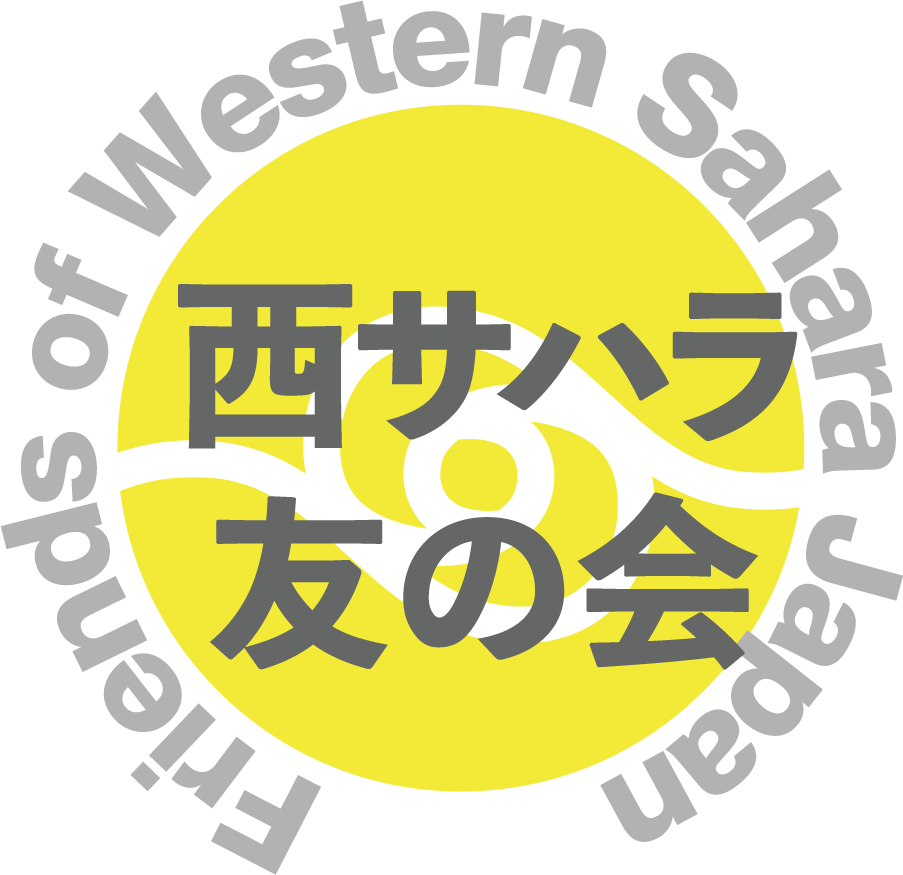西サハラ問題の解決を求める世界の研究者による宣言
2020年11月21日
西サハラ問題の解決を求める世界の研究者による宣言
今年11月12日、世界39ヶ国360名の研究者の賛同を得て、以下の研究者宣言が発表されました。日本からは54名の研究者が賛同しました。全賛同者を記した宣言文が茂木敏充外務大臣に送られました。
宣言の最初の呼びかけ人となった5人の学者は、イザベル・マリア・コルテサン・カジミロ氏(モザンビークのフェミニスト、元国会議員、エドゥアルド・モンドラーネ大学教授)、ノーム・チョムスキー氏(言語学者、社会批評家、マサチューセッツ工科大学名誉教授)、ボアヴェントゥラ・デ・ソウザ・サントス氏(ポルトガルの社会学者、世界社会フォーラム推進者の一人、コインブラ大学名誉教授)、スティーブン・ズネス氏(米国の政治学者、中東アフリカ研究者、サンフランシスコ大学教授)、勝俣誠氏(アフリカ研究者、明治学院大学名誉教授)でした。
日本では、岡真理(京都大学教授)、孫占坤(明治学院大学教授)、長沢栄治(東京大学名誉教授)、箱山富美子(元藤女子大学教授)、古沢希代子(東京女子大学教授)、松野明久(大阪大学教授)が呼びかけ人になりました。
宣言は「サハラーウィ人民支援連帯ヨーロッパ調整(EUCOCO – Coordination Européenne d’Appui et Solidarité avec le peuple Sahraoui、代表ピエール・ガラン氏)とポルトガル西サハラ友好協会(AAPSO – Association d’Amitié Portugal-Sahara Occidental、代表ルイーザ・テオトニオ・ペレイラ氏)」のイニシャティブによるものです。
私たち研究者は、アフリカ最後の植民地、西サハラの人民のために、
国際法の遵守と人権、自決権の尊重を呼びかけます
今から10年前の2010年10月8日、西サハラの中心都市エル=アイウンからほど近いグデイム・イジーク(Gdeim Izik)というところに、数千人のサハラーウィ(西サハラの人々)がテント村を設営しました。目的は、不法なモロッコ占領に起因する弾圧と差別に抗議を表明することでした。サハラーウィはそれを「尊厳のキャンプ」と名付けました。それは「アラブの春」の先駆けと言われた抗議行動でした。
人びとは、それから4週間にわたって、平和的で民主的、そして機能するコミュニティを維持しました。それは彼らがめざす将来の国のモデルを示しているかのようでした。しかし、モロッコの占領軍は、それが非暴力の抗議行動であったにもかかわらず、出入りする人びとに嫌がらせを行い、ついにはテントを破壊しました。その過程でキャンプ参加者の数名が死亡し、数百人が逮捕され、数十人が殴打されました。
このモロッコ軍の弾圧は、国連安全保障理事会をはじめ各国政府、人権団体が非難するものとなりました。それでもモロッコの裁判所は25人のサハラーウィを裁判にかけ、厳しい判決を言い渡しました。そのときの裁判は世界中の法律家、オブザーバー、団体によって不公正な裁判だとみなされています。
これまでさまざまな分野のサハラーウィたちがデモ、ストライキ、文化保護活動などを通じて、モロッコの占領に対する市民的抵抗を行ってきました。テーマは教育政策、若者の雇用、人権、政治囚の釈放、そして自決権です。しかし、こうした行動はいつも占領軍の暴力に会い、人権擁護活動家たちは殴打、銃撃、投獄、拷問などの弾圧を受けてきました。一方で、モロッコ政府は占領地に何万人ものモロッコ人を移住させました。これは国際法上許されないことであり、西サハラの人口構成を著しく変えるとともに、先住のサハラーウィに対する差別を助長しています。また、モロッコはサハラーウィに属すべき天然資源の収奪も行っています。
国連や国際司法裁判所を始め、国際社会は西サハラを非自治地域と認めており、西サハラの人民は国際法によって自決の権利を与えられています。そこには独立という選択肢も含まれています。もし、モロッコの不法な西サハラ占領を終わらせることができなければ、武力による領土拡張を禁じた長年の国際原則に対する侵害の一個の危険な前例となってしまいます。
サハラーウィを代表する民族主義団体であるポリサリオ戦線(Polisario Front)の軍事部門は、1991年に取り決めた停戦を守り続けてきました。それは国連が住民投票の実施を約束したからでした。しかし、モロッコは住民投票の実施を拒み続けています。国際法が遵守されず、対話のチャネルが崩壊し、現地で非暴力抵抗運動が弾圧されている状況下で、国連が決議を今日まで実施できないでいることは、この先地域全体を不安定にしかねません。
西洋諸国はアラブ・イスラム世界において宗教的過激主義やテロリズムに傾倒する運動が広がっていることに憂慮を表明しています。しかし、自決権を要求する西サハラ人民の世俗的な非暴力運動を支援できていない現状は、「非暴力は有効でない」、西洋諸国は友好国の独裁的政権による非暴力・民主的運動の弾圧を黙認するつもりだとのメッセージを送っており、過激な傾向を助長するだけです。
過去2年、スーダンでは民衆による民主化闘争が抑圧的な体制を倒し、アフリカのいくつかの国でも同様に民衆による挑戦が行われました。アラブの春から10年たった今、アラブ世界における社会正義及び政治改革への要求は今なお強いものがあります。それは西サハラにおいても例外ではなく、こうした動きは支援される必要があります。
この声明に賛同するわれわれはさまざまな国でさまざまな分野の研究に従事する学者です。グデイム・イジーク10周年にあたり、国連と各国政府に対し、西サハラ人民の自決権を保障する具体的な行動をとるよう呼びかけます。それは、国際社会が約束した住民投票を実施することに他なりません。住民投票によってサハラーウィは自由で公正なやり方で彼ら自身の未来を決めることができるのです。それによって初めて、彼らの否定され続けた尊厳を回復することが可能になるのです。
2020年9月・10月
Support for International Law, Human Rights, and the Right of Self-Determination for the People of Western Sahara, Africa’s Last Colony
Ten years ago, on October 8, 2010, in the first mass demonstration of what was to become known as the “Arab Spring,” thousands of Sahrawis protesting against repression and discrimination from the illegal Moroccan occupation of their country set up a tent city in Gdeim Izik, which they named the Dignity Encampment. For over four weeks, the protesters created a peaceful, functional, and democratic model of what their country could be. Despite the completely nonviolent nature of the protest, Moroccan occupation forces besieged it, harassed those entering and leaving, and eventually destroyed the encampment, killing several protesters, arresting hundreds, and beating scores of others.
The attack was condemned by the United Nations Security Council, human rights organizations, and governments around the world. Still, Moroccan tribunals convicted 25 Sahrawis to heavy sentences in what international lawyers, observers and organizations considered as unfair trials.
For years, Sahrawis from different sectors of society have engaged in protests, strikes, cultural celebrations, and other forms of civil resistance against the Moroccan occupation of their country, focusing on such issues as educational policy, youth employment, human rights, the release of political prisoners, and the right to self- determination. Such activities have been routinely met by violence from Moroccan occupation forces, with the widespread use of beatings, shootings, jailing, and torture of human rights defenders. Meanwhile, the Moroccan government has illegally brought in many tens of thousands of Moroccan settlers into the occupied territories, dramatically altering Western Sahara’s demographics and further institutionalizing discrimination against the indigenous Sahrawi population, while plundering the natural resources that belong to them.
The United Nations, the International Court of Justice, and the international community as a whole recognizes Western Sahara as a non-self-governing territory which, under international law, must be granted the right of self-determination, including the option of independence. Should Morocco’s illegal annexation of Western Sahara not be reversed, it will establish a dangerous precedent in violation of the longstanding international doctrine that prohibits countries to expand their territories by force.
The armed forces of the POLISARIO Front, the representative organization of the Sahrawi nationalist movement, have honored the 1991 cease fire established in return for a promised UN-supervised referendum by the Sahrawi people on the fate of their territory, but
Morocco has persistently refused to allow the plebiscite to take place. This denial of compliance with international law, the paralyses of dialogue channels between the parties, the ongoing repression of nonviolent resistance, and the failure of the United Nations to enforce its resolutions can contribute to growing destabilization in the entire region.
Western nations have long expressed concerns over the rise of movements in the Arab and Islamic world which have embraced religious extremism and engaged in terrorism. The failure to support the nonviolent secular campaign for self-determination in Western Sahara will only encourage extremist tendencies by sending the message that “nonviolence doesn’t work” and that Western nations are willing to acquiescence to the suppression of nonviolent democratic movements by allied autocratic governments.
Over the past two years, popular pro-democracy struggles have toppled a very repressive regime in Sudan and challenged several governments in the region. In the decade since the Arab Spring, the desire for social justice and political freedom is still strong throughout the Arab world, including Western Sahara, and needs to be supported.
We, scholars in a variety of fields from different nations, call upon the United Nations and our individual governments to honor the memory of Gdeim Izik on its tenth anniversary in taking concrete action to ensure the right of self-determination by the people of Western Sahara by moving forward with the promised internationally- supervised referendum allowing the Sahrawis to determine freely and fairly their own future. Only then will be possible to restore the dignity that continues to be denied to them.
September-October 2020
Isabel Maria Cortesão Casimiro, Eduardo Mondlane University, Mozambique
Noam Chomsky, U.S.A.
Makoto Katsumata, Meiji Gakuin University, Japan
Boaventura de Sousa Santos, University of Coimbra, Portugal
Stephen Zunes, University of San Francisco, U.S.A.
